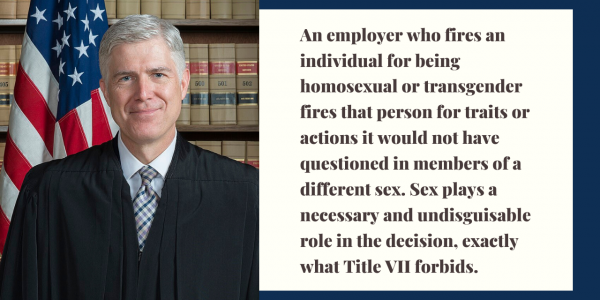
EXPLAINER: Bostock v. Clayton County
What happened?
Led by Justice Neil Gorsuch, The Supreme Court came to a 6-3 decision that LGBTQ+ individuals could not be fired by employers based on sexual orientation or gender identity in the landmark case, Bostock v Clayton County.
Clayton County, Georgia fired employee Gerald Bostock because he was in a gay softball league. After Donald Zarda told his employers at Altitude Express he was gay, the company fired him. Aimee Stephens, who was hired at R. G. & G. R. Harris Funeral Homes when she was presenting as a male, was fired after she told the company she would be living as a woman.
The three individuals each sued their respective employers for wrongful termination because they argued the employers were in violation of the Civil Rights Act of 1964. The American Civil Liberties Union (ACLU) represented Zarda and Stephens, while Buckley Beal LLP represented Bostock.
Who agreed with the majority opinion?
- Chief Justice John Roberts
- Justice Neil Gorsuch
- Justice Stephen Breyer
- Justice Ruth Bader Ginsburg
- Justice Sonia Sotomayor
- Justice Elena Kagan
Justice Brett Kavanaugh
- Justice Samuel Alito
- Justice Clarence Thomas
The three arguments
Gorsuch wrote the majority opinion with Kavanaugh writing a dissent and Alito and Thomas writing another dissent. One case can have multiple dissents because they are used to fight a flaw in the logic or reading of the Constitution by the majority opinion.
Gorsuch wrote that LGBTQ+ persons are protected by Title VII of the 1964 Civil Rights Act because they are discriminated based on sex. His argument centered on the theory that if Bostock and Zarda were female, they could not be fired because they were attracted to males. Additionally, if Stephens was born a female, she could be fired because she was a female.

Alito’s dissent focused on the fact sexual orientation and gender identity are not listed in Title VII’s list of protected persons. He also went on to criticize Gorsuch’s definition of textualism and included the bathroom argument in his dissent. Thomas joined Alito’s dissent.
Kavanaugh dissented because, as he argued, Congress did not originally take into consideration gender identity or sexual identity when passing the 1964 Civil Rights Act, therefore, the Supreme Court cannot reinterpret the law.
Why is it important Gorsuch wrote the majority opinion?
- Gorsuch is one of President Donald Trump’s appointees. Trump was in favor of the employers and signed multiple Executive Orders limiting the rights of LGBTQ+ persons.
- Additionally, Gorsuch sided with the rights of employers in previous cases like Sebelius v. Hobby Lobby Stores during his time on the Tenth Circut Court.
- Gorsuch is a self-proclaimed textualist. Textualists tend to be more conservative in their rulings.
- A Trump-appointed textualist who ruled corporations are a person under the United States Constitution writing the majority opinion of a case protecting LGBTQ+ persons is noteworthy.
How did Bostock, Zarda and Stephens make it to the Supreme Court?
Stephens' case:
Stephens filed a complaint with the Equal Employment Opportunity Commission (EEOC) after being fired.
United States District Court for the Eastern District of Michigan sided with the employer on grounds of religious exemption.
EEOC appealed to the Sixth Circut Court who reversed the decision.
The employer filed a writ of certiorari to the Supreme Court could hear the case.
Stephens died May 12, 2020. Her estate continued the case.
Zarda’s case:
United States District Court for the Eastern District of New York ruled in favor of the employer.
Zarda died Oct. 3, 2014, but his family continued the case.
Zarda’s team appealed to the United States Court of Appeals for the Second Circuit, a three-judge court agreed with the original ruling. However, a full-court reversed both previous rulings.
Altitude Express petitioned the Supreme Court to hear the case.
Bostock’s case:
United States District Court for the Northern District of Georgia dismissed Bostock’s case.
Bostock appealed to the Eleventh Circut Court
The Eleventh Circut Court upheld the original ruling.
Bostock applied for a writ of certiorari from the Supreme Court
Difference between the Civil Rights Act and Equal Rights Act
- Gorsuch used pre-existing language from the Civil Rights Act of 1964 to justify that LGBTQ+ individuals could not be fired by their employers for their sexual preference and gender identity.
- However, after this decision, some called for the ratification of the Equal Rights Act, so what’s the difference?
- The Equal Rights Act was proposed in 1923 in order to guarantee women the same rights as men. The act failed in 1923 and despite multiple attempts at reintroduction, it never passed.
- The Civil Rights Act of 1964 includes language that limits discrimination based on sex, but does not explicitly guarantee all non-cisgender men equal rights and protections.
What's next?
While Bostock v. Clayton County does set a precedent for a federal law protecting LGBTQ+ individuals and opens the door for future cases, it does not mean everyone is equal quite yet.
The Civil Rights Act’s Title VII only prevents discrimination, it does not automatically give equal rights to everyone. Furthermore, there are still loop-holes in religious exemptions for employers.
In Justice Alito’s dissent, he said this decision could make it harder for religious schools to discriminate based on their teachings. Dissents do have the power to become precedents, but that is contingent on the court arguing the case.
This case does set a major precedent, but future judges could decide to read the law differently and come to a differing decision. Without an amendment guaranteeing equal rights for all, the Constitution is always going to be up for interpretation.
